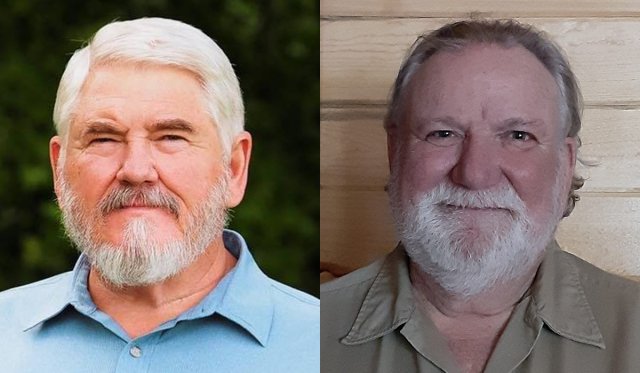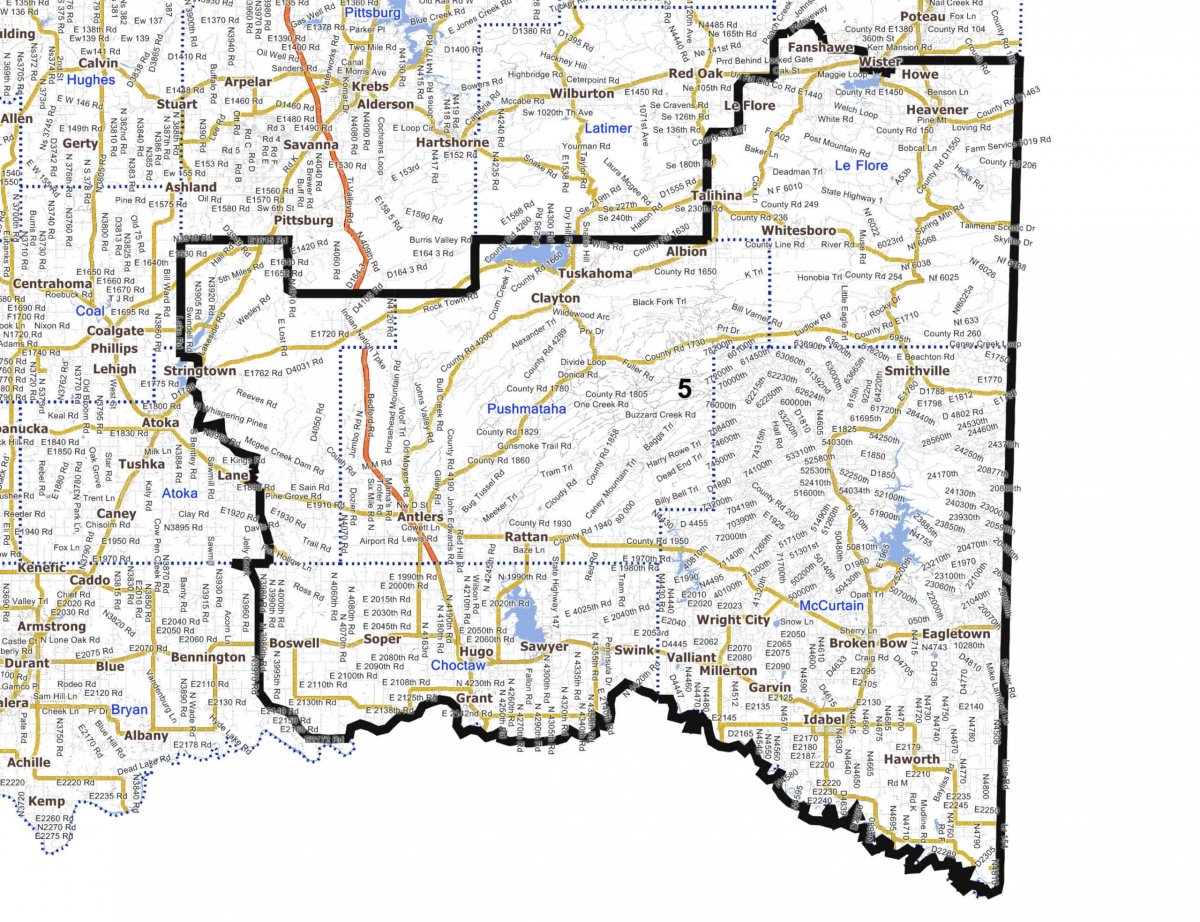

There are two candidates vying for the Oklahoma Senate District 5 seat Sen. Joseph Silk (R–Broken Bow) vacated to run for Congress this year, and they both say they know the district’s true political leanings.
They just don’t agree on what those leanings look like.
George Burns, says he is a proud Trump Republican and that the president’s platform protects the interests of the citizens he is running to represent. Randy Coleman, a minister from Broken Bow, disagrees.
Though Coleman is running as a Democrat, he says he better belongs to what he calls the “Party of Common Sense.” Voters in SD 5, he believes, are sick of partisan politics.

‘Trump Train’ v. ‘Common Sense”
Scrolling through Coleman’s Facebook page, you won’t find a ton of information about the candidate’s platform. Apart from a shared post expressing support for pipelines and a photo of the candidate sporting an NRA baseball cap, Coleman’s feed is primarily made up of graphics he made himself.
These graphics explain an idea Coleman considers central to his campaign: his nonpartisanship.
“I’m running for the people of southeast Oklahoma,” he said. “I’m not running for the Democratic Party. I’m not running for the Republican Party.”
Coleman explained that he considers himself a true moderate. Voting for legislation solely on party lines, he feels, would be irresponsible.
“If you just vote party line, that to me is not common sense,” he explained. “So my agenda, if I was to get elected, would be to look at every proposed bill and determine, ‘Does it benefit the people of southeast Oklahoma?'”
Coleman said he believes his opponent would vote “straight line.”
Burns said his convictions in conservative values are extremely strong, and that he would work hard to see them met as the SD 5 senator.
“Conservative values,” he said. “It’s a big deal anywhere, not just in this community, but for all of America.”
For Burns, supporting these values in 2020 relies heavily on taking the lead from President Donald Trump. On his campaign’s website, he lists his qualifications for office, including: “A Supporter of Donald Trump.”
Burns has largely remained civil during this election cycle. However, he did share a post to his Facebook page ahead of the June 30 primary saying his opponent for the district’s Republican nomination, Justin Jackson, was “in the hip pocket of the governor.”
“Stopping corruption” is one of Burns’s central promises, similar to Trump’s “drain the swamp” campaign promise in 2016.
“He’s the only president I’ve ever known of that did what he said he was gonna do,” Burns said. “He’s going to build a wall. He’s going to protect our Second Amendment. That’s very, very important.”
Burns and Coleman see the same issues
Though the two candidates have very different views of SD 5’s political leanings, they are on the same page about the most important issues for voters.
Ensuring citizens have access to affordable energy is near the top of both of their lists.
Burns said he worries the upcoming election could mean harsher federal legislation regulating the U.S. oil and gas industry. He believes this would have detrimental effects on southeast Oklahoma’s economy.
“I’m big into energy,” he said. “We can start working on gas plants, well then they can decide they don’t want to have gas either, and they’ll shut down our whole industry for oil and gas. That’s what’s being threatened.”
Burns, who owns part of an engineering and construction firm, previously served as the head of Choctaw Electric Cooperative near his hometown, Haworth.
Coleman also sees the negative local impacts a transition away from oil and gas could have for his community. As a Democrat, he said his pro-fossil-fuel status often confuses people.
“I had a conversation with a lady the other day, and she asked me why I was all for the pipeliners,” Coleman said. “I said look, some day I’d like to be able to have renewable energy sources, but right now, this is what the people in my district can afford.”
Both Burns and Coleman also care a great deal about protecting citizens’ right to bear arms. But they do not necessarily agree on why.
For Burns, it is a matter of protecting citizens’ constitutional rights.
“You lose your Second Amendment, you lose your constitution,” he explained. “And you lose your God-given right.”
But Coleman said gun rights have an economic significance in the area, which boasts sprawling woods that attract hunters. A proud member of the NRA, he said the organization does a lot to preserve hunting grounds like the ones he hopes to represent.
“I’m a conservationist,” Coleman said. “And I’m a member of the NRA, which, believe it or not, is a conservationist group.”
Both Burns and Coleman see a great importance in preserving SD 5’s natural landscape. In recent years, southeast Oklahoma’s tourism industry has experienced a boom — largely because of its mountains, forests and lakes.
A slower pace of life and a unique set of challenges
According to both candidates, SD 5’s lakes are one of their biggest economic assets and one of their most vulnerable natural resources.
Over the years, however, Burns and Coleman said they have seen the preservation of the region’s freshwater put on a back burner. Outside interests, they said, have been attempting to build an extensive network of pipelines in the area that would pump water out of the district and into Oklahoma’s cities.
“That was the big main reason that I ran is I didn’t want them to pipe it off,” Coleman said.
Stopping this is vital to protecting SD 5’s already weak economy, according to both candidates.
“The tourism is probably the number one thing that would be affected by water,” said Coleman. “And tourism has brought in so many dollars that we are now catching up with the rest of the world. Because we were such a poor county. We’re not as poor anymore, we actually can pay decent wages.”
For Burns, the hope is that supporting the tourism industry will create new jobs, something he says the district desperately needs.
“Protecting our water is a big deal,” he said. “Bringing in new businesses is a big deal.”
As the two candidates explained, while they would not give up their laid back lifestyles, living in such a rural area has some drawbacks. Paramount among these is the hefty price tag.
Here, the candidates said, people pay more for their basic amenities. Electric bills are higher. Gasoline is more expensive. People have to travel greater distances to access adequate health care.
The district is in desperate need of additional funding, and the candidates agree that increasing employment opportunities is the key to securing it.
“The way to get money is to have new jobs, where people just pay the regular taxes into the counties, into the areas in the state,” Burns said. “I do not want to raise taxes, that’s for sure.”




















